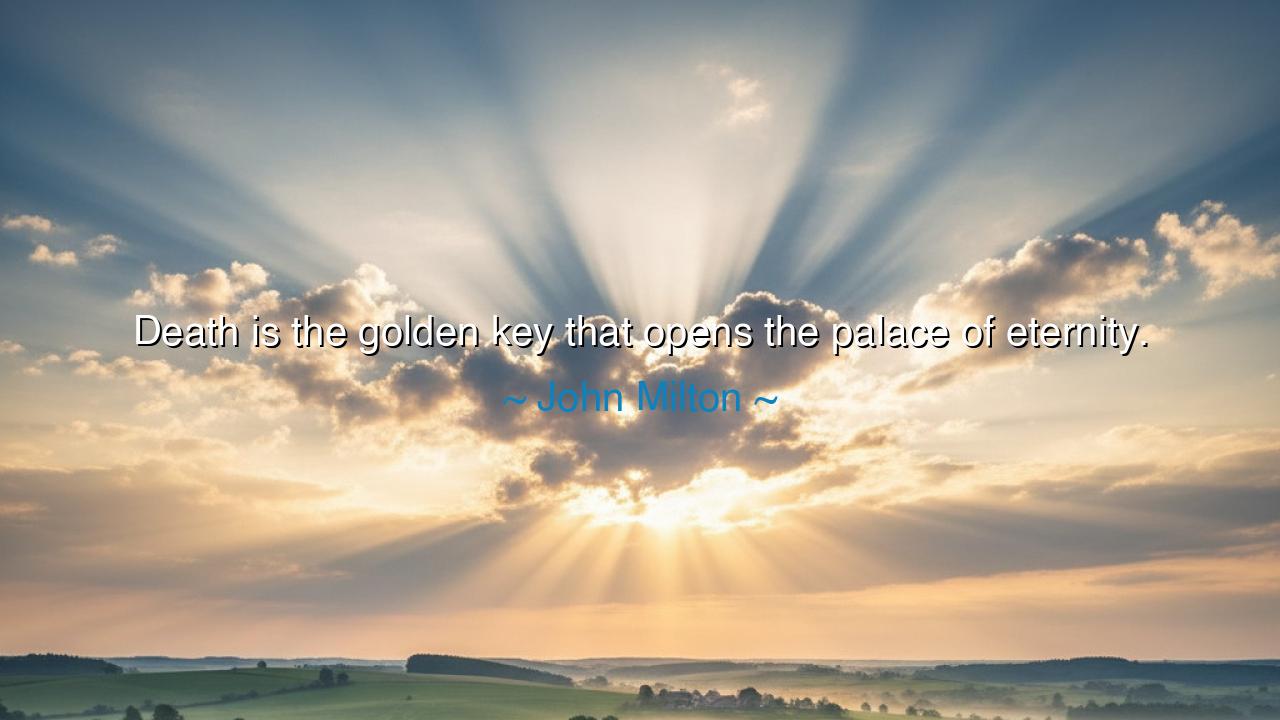
Death is the golden key that opens the palace of eternity.






“Death is the golden key that opens the palace of eternity.” Thus wrote John Milton, the blind prophet of English verse, whose pen gave birth to Paradise Lost and to visions of Heaven and Hell that still thunder through the ages. In these words, he does not lament death as the end of life, but exalts it as the doorway to eternity, the radiant threshold through which the mortal sheds his frailty and enters the realm of the divine. To him, death is not a thief, but a key — not a shadow, but a passage. It is the moment when the chains of time fall away, and the soul stands unveiled before the infinite.
Milton lived and wrote in an age of turbulence — civil war, plague, and blindness — yet he held fast to faith in the unseen. When sight failed him, when his world grew dark, he turned inward and upward, seeking light beyond the grasp of the body. In that inner vision, he found truth: that mortality is not a curse, but a preparation, a schooling for eternity. Death, he believed, is not destruction, but transformation — the soul’s awakening from the dream of the flesh to the dawn of everlasting life. In calling it “golden,” he reveals its sacred purpose: for gold is purified by fire, and so, too, must life be refined through loss before it enters the palace of the eternal.
The palace of eternity, as Milton names it, is the dwelling place of the soul’s fulfillment — a realm beyond sorrow, beyond decay, beyond all that binds man to the dust. For the poet, death was not a tragedy but a transcendence, the moment when human limitation yields to divine promise. Such vision springs from faith, but also from wisdom — the understanding that all life moves toward its source, as rivers flow toward the sea. To fear death, then, is to fear completion; to resist it, to deny the very rhythm that sustains the cosmos. Milton’s words call us not to long for death, but to honor it, to see in it the crowning moment of life’s journey — the final unlocking of what was always meant to be.
History, too, offers witness to this truth. Think of Socrates, who, condemned to drink the hemlock, met death not with trembling but with serenity. He spoke to his disciples of the immortality of the soul, assuring them that the philosopher spends his life preparing for this very moment — the parting of body and spirit. “Death,” he said, “is either a dreamless sleep or a journey to another world.” In that calm acceptance, he revealed what Milton would later proclaim in poetry: that death is not an end to be dreaded, but a door to be opened. The golden key turns only once — but what it unlocks is everlasting.
Yet, there is another layer to Milton’s wisdom — one that speaks not only to faith but to how we live. For if death is the golden key, then life is the forging of that key. Every act of love, every struggle for virtue, every sacrifice for truth is a stroke of the hammer shaping it. A selfish life yields a rusted key that fits no lock; a noble life, tempered by grace, gleams fit for the gates of eternity. In this way, Milton’s words are both a comfort and a charge: to live in such a manner that when death comes, it finds us not clinging to the earth, but ready to step through the door we have prepared.
This understanding transforms our relationship with mortality. It teaches that fear of death is born from an unlived life. He who has fulfilled his purpose, loved deeply, and sought truth will greet death as one greets the setting sun — with gratitude, not despair. For the soul that has known meaning does not die; it merely changes form, passing from the narrow corridors of time into the boundless halls of eternity. Thus, death, though feared by many, is the most natural act of existence — the closing of one chapter so that the next may unfold.
So, my child, take this lesson to heart: do not dread death; dread a life without purpose. Every sunrise you see, every kindness you give, every wrong you right — these are the metals from which your golden key is forged. Live not as though eternity awaits you only at the end, but as though you already walk within its shadow. Treat each day as sacred preparation, each breath as a prayer. And when your hour comes, may you find that your key, bright with the light of your deeds, fits perfectly into the lock of the palace of eternity, and that beyond it lies not darkness — but the eternal dawn.






AAdministratorAdministrator
Welcome, honored guests. Please leave a comment, we will respond soon